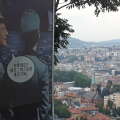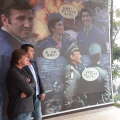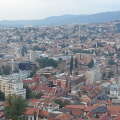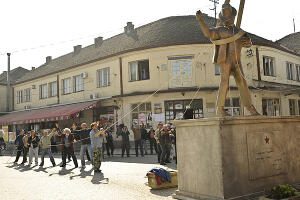The Academy Announces 87 Foreign Films Competing for Award
The Academy of Motion Picture Arts and Sciences announced the 87 films from South-east Europe and around the world that will be competing this year for the Best Foreign Language Film award. Nominations for the 91st Academy Awards will be announced on January 22, 2019. The ceremony will take place on February 24, 2019.
Below are this year’s submission from all the South-East European countries (and more!):
Belarus was the first country to announce its submission this year with Darya Zhuk’s drama Crystal Swan. Set in the 1990’s, a peripatetic young DJ is derailed by a typo in a forged US Visa application, forcing her to a backwater village where she is determined to fake her way to the American dream. This will mark the third Belarusian submission so far.
Bosnia and Herzegovina has selected the drama Never Leave Me directed by Aida Begić. This co-production with Turkey tells the story of three displaced Syrian boys living a difficult life as refugees in the magical, mythical Turkish city of Sanliurfa. Searching for recovery from a traumatic past, the children cross the path from destructiveness and hostility to meaningful existence and love. Bosnia won this category in 2001 with Danis Tanović’s No Man’s Land.
Bulgaria has chosen Ilian Djevelekov’s Omnipresent. The film’s protagonist is Emil, a writer and owner of an advertising agency who gradually becomes obsessed with spying on his family, friends and employees with hidden cameras. In October 2017, this feature triumphed at Bulgaria’s Golden Rose film festival, winning Best Film, Best Actor and Actress, as well as the Audience Award categories. In 2009, Stephan Komandarev’s The World is Big and Salvation Lurks Around the Corner made the shortlist but was not nominated.
Croatia will be represented by Ivan Salaj’s political comedy drama The Eighth Commissioner. It tells the story of an ambitious politician caught in a scandal and exiled to a remote island to keep him out of the public eye. There, he is tasked with organizing local elections – something his seven predecessors have failed to accomplish… Croatia has never been nominated in this category in the past.
Czech Republic has chosen Olmo Omerzu’s road-trip comedy Winter Flies. The story follows two mischievous adolescent boys who embark on a journey of misadventure and self-discovery. This film made its worldwide debut in July at the Karlovy Vary International Film Festival, where it won the Best Director category. Czech Republic has been nominated three times for the foreign language category, and won in 1996 with Jan Svěrák’s Kolya.
Estonia has selected Take It or Leave It directed by Liina Triškina-Vanhatalo. The film tackles themes of responsibility, single parenthood, and economic inequality. It tells the story of a 30-year-old construction worker who suddenly becomes a single parent when his ex-girlfriend delivers a baby girl, and informs him that she’ll put the child up for adoption unless he wants to take care of her. This is the third time Estonia has chosen a movie from producer Ivo Felt, whose 2014 Tangerines directed by Zaza Urushadze received the country’s only nomination.
Georgia has chosen Namme directed by Zaza Khalvashi. This lyrical feature had its international premiere at the Tokyo Film Festival. It is the story of a family determined to protect an ancient and venerated water source at all costs. Set in an idyllic rural location where Muslims and Christians live peacefully side by side, the ancient healing qualities of the water are threatened by the construction of a hydroelectric power station, which is blamed for the loss of the spring waters. Giorgi Ovashvili’s Corn Island made the shortlist in 2014 but was not nominated.
Greece will compete with writer-director Dora Masklavanou’s period drama Polyxeni. Set in 1955, the film centers on an orphaned 12-year-old girl, who embarks on a new life following her adoption by a prominent couple, seemingly unaware of devious designs on her large inheritance. Greece has been nominated five times for this category, with its most recent nomination for Yorgos Lanthimos’s 2010 feature Dogtooth (which lost out to Denmark’s In a Better Worlddirected by Susanne Bier).
Hungary has selected Sunset directed by László Nemes, which won the International Federation of Film Critics award at the 75th Venice International Film Festival. Set in Budapest on the eve of World War I, the film follows a young woman who arrives from Trieste looking for work at the elegant hat store once owned by her parents. Rebuffed by the shop’s current owner, she is drawn into a mystery surrounding her long-lost brother. Nemes won the Oscar in this category for the Holocaust drama Son of Saul in 2016, marking Hungary’s second win after István Szabó’s Mephisto in 1982.
Kosovo has chosen Blerta Zeqiri’s debut feature The Marriage. The romantic drama focuses on the experience of a bride, unaware that the man she is about to marry is still in love with his best friend. It marks only the fifth year Kosovo has entered the race for an Academy Award, and the first time the country has submitted a film by a female filmmaker.
Macedonia has submitted Gjorce Stavreski’s Secret Ingredient for consideration. In this dramedy, an underpaid train mechanic gives his father a cake made of stolen marijuana to relieve his cancer pain. However, he is soon cornered by criminals searching for their drugs and the nosy neighbors who want a recipe for the mysterious “healing” cake. In 1995, Macedonia earned a nomination with Milcho Manchevski’s Before the Rain, but lost out to Russia’s Burnt by the Sun directed by Nikita Mikhalkov.
Montenegro is sending Gojko Berkuljan’s Iskra. This thriller follows a retired detective whose life is interrupted when his daughter disappears, and his investigation leads him back to his past. It marks only the fifth time Montenegro has competed in this category, and has yet to secure a nomination.
Romania will be represented by Radu Jude’s I Do Not Care If We Go Down in History as Barbarians. The film won the Crystal Globe for best film at the Karlovy Vary Film Festival. Set in present-day Romania, the film centers on a stage director preparing to mount a monumental historical re-enactment of an episode from the Holocaust: the massacre of tens of thousands of Jews by Romanian troops in Odessa. The title refers to an actual quote from a Romanian government minister in 1941. The director battles against official unease about the allegedly unpatriotic nature of the play, the trivialization of horrific historical events, and a revival of nationalist fervor in the country. Romania made the shortlist in 2012 with Cristian Mungiu’s Beyond the Hills but was not nominated.
Serbia will compete with Dejan Zečević’s Offenders. This thriller centers on three university students, who set up experiments around the city to prove the “Tetris” theory of chaos. Under that theory, human nature inevitably deteriorates from order to anarchy… Srdan Golubović’s thriller The Trap made the shortlist in 2008 but was not nominated.
Slovakia has selected The Interpreter directed by Martin Šulík as its entry. It tells the story of an 80-year-old man who finds a book by a former SS officer detailing his activities in Slovakia during World War II. Realizing that his parents were executed by the officer, he sets out to get his revenge but instead meets the officer’s 70-year-old son (Toni Erdmann star Peter Simonischek), who hardly knew his father. With the officer’s son acting as interpreter, the two men embark on a journey of discovery of the past and their own identity. Slovakia has not been previously nominated.
Slovenia has chosen Ivan, directed by Janez Burger (Silent Sonata). The film focuses on Mara, a young woman caught in a violent corruption affair and forced to make an impossible choice between the man she obsessively loves and her newborn son, Ivan. In September 2017, the film swept the Slovenian Film Festival, taking eight prizes, including Best Film, Best Screenplay, Best Cinematography, and Best Actress.
Slovenia has not been previously nominated.
Turkey’s contender will be Nuri Bilge Ceylan’s The Wild Pear Tree. This feature, which premiered in competition in May at Cannes, is Turkey’s fifth submission directed by Ceylan. The film tells the story of an aspiring writer who returns to his native village, where he pours his heart and soul into scraping together the money he needs to be published, only for his father’s debts to catch up with him. Ceylan’s Three Monkeys made the shortlist in 2008 but was not nominated.
Author:
Georges Aintablian is a Los Angeles based international film critic. He has been following Academy submissions for the last 20 years, and has a special interest in French films, Latin American Cinema (especially Mexico and Brazil), Middle Eastern films, and Asian Cinema (especially South Korea, China, and Japan). Georges speaks 8 languages, and writes about World Cinema and major film festivals in L.A. on his blog Cinémaniaque Films.
See his profile on Letterboxd.
WWII Resistance Hero Immortalized in Iconic Film gets Museum in Sarajevo
During the recent Sarajevo Film Festival (sff.ba) Bosnian Film Center announced plans for a new Museum dedicated to the legendary film about the WWII resistance hero, Vladimir Peric, popularly known by his undercover name Walter. He was killed in the final battle for Sarajevo against the Nazi occupying forces in April 1945.
There is a unique cinematic connection to Walter. Quarter century ago Bosnian and Yugoslav director Hajrudin “Siba” Krvavac made the iconic film Walter defends Sarajevo, the third in his trilogy of WWII movies about partisan resistance fighters. Walter has since gained a cult status even in China (“Some 1.3 billion people now live in China and half of them have seen Walter Defends Sarajevo,”) as well as a reference point for defiant Sarajevans during the siege of the city in the 1990s. The closing line of the film, spoken by a Nazi officer looking down on the city from the hillside vintage point, “Das ist Walter,” (“This is Walter”) has become the defining moment to characterize Sarajevo as the city that will always stand tall in face of aggression and injustice.
Jasmin Durakovic, filmmaker and director of the Bosnian Film Center was joined by Alen Cengic, owner of the Park of the Princes restaurant where the press conference about the Museum was held – at the very spot where the iconic ending of the film took place. “Walter Defends Sarajevo has attained the status of a cult achievement of our cinema,” said Durakovic. “This film is one of the few widely recognized and uniquely Sarajevan reference points which is why the Sarajevo Film Center has decided to create the Museum dedicated to the film.”
The Walter Museum is expected to be completed in two months and will be located in the Film Center’s building (former Sutjeska Film Studio) in downtown Sarajevo. On the site of Park of the Princes restaurant overlooking the city a giant mural backdrop commemorates some of the scenes from the film – with Chinese subtitles. Even before the media event was over groups of Chinese tourists flocked to the site and started taking photographs. Young couples with children instantly recognized the imagery from the beloved film of their parents’ generation and enthusiastically confirmed that Walter still holds his immortal cinematic place in the hearts of the Chinese people. Bathed in the afternoon light the city of Sarajevo was lying below, its spirited citizenry in the party mood for the film festival. Yet quiet echoes of the legendary film live on in Sarajevo where one line of a movie dialogue forever defined its unconquered spirit. After all this is not an ordinary city. Das ist Walter.
- “Walter Defends Sarajevo” poster in China
Editor’s note:
Hajrudin “Siba” Krvavac (1926 – 1992) is best known for his hugely popular trilogy of war movies about WWII partisans whose heroic resistance became the stuff of legends: The Demolition Squad (Diverzanti, 1967), The Bridge (Most, 1969) and Walter Defends Sarajevo (Valter brani Sarajevo, 1972). Krvavac was also a well known documentary director. He was among the internationally acclaimed Bosnian filmmakers whose movies made the name of the production company Sutjeska Film Sarajevo known well beyond the country’s borders. He died in July 1992 during the Siege of Sarajevo. “However, Krvavac lived long enough to see the people of Sarajevo in 1992 chant, “We Are Walter!” in protest of the conflict.” (wiki)
Gyula Gazdag receives Lifetime Achievement Award in Budapest
We are delighted to share with SEEfest fans the news from Budapest where our festival’s long time friend and renowned filmmaker, educator and mentor Gyula Gazdag was honored at the Budapest International Documentary Festival with the Lifetime Achievement Award. Congratulations!
Gyula Gazdag is a professor at UCLA School of Theater, Film and Television. He has served as the Artistic Director of the Sundance Filmmakers Lab since 1997. Gazdag has been a creative advisor at the Maurits Binger Film Institute in Amsterdam since 2002, and at the Script Station of the Berlinale Talent Campus since 2006. Daily Variety selected him as one of the ten best film teachers of 2011. His numerous feature films include A Hungarian Fairy Tale, winner of Best Feature Film of the Year of the Hungarian Film Critics and screened at Cannes Directors’ Fortnight, Stand Off, winner of a Special Jury Prize at the San Sebastian Festival, Lost Illusions, winner of Best Screenplay at the Hungarian Film Week, Swap, Singing on the Treadmill, which was banned in Hungary for 10 years, and The Whistling Cobblestone, which was banned from foreign exhibition for 12 years. His documentary work includes The Banquet, Package Tour and The Resolution, which was named one of the 100 best documentaries of all time by the International Documentary Association, and The Selection.The latter two were also banned in Communist Hungary for more than a decade.
SEEfest was honored to have Gyula Gazdag on the jury for Best Documentary Film, and as festival advisor and cultural ambassador. Most recently SEEfest presented Gazdag’s influential documentary, Package Tour at the Los Angeles Museum of the Holocaust in November 2017.
Watch SEEfest movies online
Take advantage of one more week to watch the latest movies online. We partnered with Films2C to bring a great selection of this year’s festival films straight to your home. The selection includes features, documentaries and shorts – short fiction, short docs and animation shorts. Check out award winners and discover new, talented filmmakers. SEEfest films are available online for rental VOD, but only until June 3rd! Don’t miss out! Go to SEEfest on VOD and enjoy the wonderful selection of 2017 festival films. And please, send us your reviews and recommendations and post them on SEEfest facebook page (and while you’re there, please like and follow our page!) THANKS from all of us at SEEfest!
You can also catch online two acclaimed 2016 SEEfest films: Losers, an award-winning and irresistibly charming satire from Bulgaria; and Turkish unusual romance between two misfits, The Half.
Love movies? Become a Cine-Fan and engage with other SEEfest members, make new friends and join the journey of cinematic and cultural discovery.
Annual General Membership is $55. Student membership is $30. Click here to join today.
Whether you are a professional in the film industry, a student of the arts, or a lover of foreign films, SEEfest is your cultural connection and bridge to discover the lands, people, arts and history of the countries at the crossroads of South East Europe. With Cine-Fan membership program you will be the first to learn about upcoming programs and opportunities to shape them. Join today, and thanks!
On “Defending Cinema in Los Angeles”, the Manifesto of Locarno in L.A.
Los Angeles, 22 April 2017 — Opening night of the inaugural Locarno in Los Angeles film festival at Downtown Independent needs to be recognized for its bold effort to rescue the city from the non-stop, wall-to-wall, suffocating onslaught of ever more commercial glut. We desperately need a revolution of our mental eating habits saturated with the sugary drinks of 80% CGI sprinkled with faux sentimentality that treats us as unsuspecting kindergarteners, an easy prey for inducing a life-long addiction to nonsense.
Los Angeles is at the cutting edge of the 21st century artistic frontier in many creative disciplines and we deserve better in cinema too. This is not a question of “liking” a film. It is healthy to dislike, to critique, to shout at the programmer who put you through the rigmarole of watching “slow film” that is so opaque that it makes you angry – and that provokes you to express your opinion and engage in a heated discussion with your next-seat neighbor, perhaps a nerdy cinephile who drives you crazy with haughty references to movies you have never seen or heard of. It is healthy! As it was healthy when the LA Phil embarked in 1992 on a bold adventure with the young conductor Esa Pekka-Salonen who pushed the orchestra, as well as the audience and sponsors, to experience avant-garde programming with contemporary, experimental, innovative composers. Today LA Phil is the envy of the music world, and a world-class orchestra.
Avant-garde gives new life to everything, even the standard, run-of-the-mill programs. We need cinema that will challenge us, enrage, puzzle and delight in ways we didn’t even know we could be stimulated. It gives health-food nourishment to our poor aneurism-clogged brains and nudges our cerebral power plant to awake from the stupor of the tiresome new age and science-averse pretentious spirituality. We need it to jolt us to a state of wonder by bringing bold cinema to our Hollywood shores.
Vera Mijojlic
Artistic Director of SEEfest
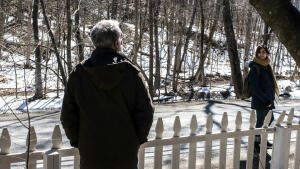
Two SEE films on the LoLA program on Sunday, 4/23: All the Cities of the North, with Serbian director Dane Komljen in person; and Scarred Hearts, by Romanian director Radu Jude.
Locarno in L.A. web site
We invite you to join us NEXT WEEK at the 12th edition of SEEfest, April 27 – May 4. Buy your festival pass today!
*NOTE: SEEfest Cine-Fan Members get a 20% discount on Festival Passes and tickets. Click here to join and get your promo code.
Blue Heron Foundation’s 15th Anniversary Concert – April 22, 2-4 PM
This year the L.A.-based Blue Heron Foundation celebrates its 15th Anniversary with an afternoon of beauty and upliftment with the music of mezzo-soprano Roxana Constantinescu.
Extraordinary years of programming in support of Romanian and Moldovan orphaned and abandoned children deserve an extraordinary celebration.
DATE: Saturday, April 22, 2017
TIME: 2:00 PM – 4:00 PM
LOCATION: West Hollywood, California (Exact address will be communicated upon ticket purchase)
TICKETS
Stefania Magidson, President of the Blue Heron Foundation, is a distinguished member of SEEfest’s Advisory Board & Chair of the Romanian Program Committee.
To read more about the Blue Heron Foundation and its critical work please go here.
Southeast European Animation Day – March 25 at East L.A. College
SEEfest has partnered with East Los Angeles College and Cinema Without Borders to present on Saturday, March 25 the Southeast European Animation Day.
Join us for a day of delightfully entertaining animated shorts and chat with well-known animation experts.
FREE event. RSVP: [email protected] or call 310 422 4629.
WHEN: Saturday, March 25th, from 11:30am – 3:00PM
WHERE: East Los Angeles College, Music Recital Hall theater (Building S2)
1301 Avenida Cesar Chavez, Monterey Park, CA 91754.
PARKING: Free parking in Structure #3 (off of Avenida Cesar Chavez) or Structure #4 (corner of Floral and Collegiate Avenues)
For details about the program check this article on Cinema Without Borders portal
IMPORTANT REMINDER: Get your festival pass for SEEfest 2017, opening April 27 at the Writers Guild Theater! We have eight days of screenings, panels, events, parties, and special guests. Book your 8-Day Full Access Festival PASS here.
Festivals: Hana Jušić and Salomé Jashi Win Top Awards In Belgrade and Zagreb
SEEfest Editorial | March 6 , 2017 — BELGRADE: Croatian Quit Staring at My Plate by Hana Jušić was awarded the Belgrade Victor for Best Film at the 45th Belgrade International Film Festival – FEST, while Serbia’s Requiem for Mrs. J by Bojan Vuletić was awarded Best Film in the National Competition program.
ZAGREB: Georgian/German coproduction The Dazzling Light of Sunset by Salomé Jashi won the Big Stamp for Best Film in the International Competition of the 13th edition of ZagrebDox.
Hungarian, Romanian and Croatian Films Win Prizes in Berlin
Congratulations to Eastern European women filmmakers on their great success at the 2017 Berlin International Film Festival, Berlinale. Golden Bear for best film went to Hungarian feature On Body and Soul directed by Ildiko Enyedi, a filmmaker returning to form after 18-year long hiatus. All winners from Eastern Europe are women, another first. Here’s the list:
HungarianOn Body and Soul won the top prize, GOLDEN BEAR. Directed by Ildiko Enyedi.
Polish director Agnieszka Holland was awarded the Silver Bear Alfred Bauer Prize for Pokot (Spoor).
Silver Bear for Outstanding Artistic Contribution went to Romanian sound designer Dana Bunescu, who worked on Ana, Mon Amour (directed by Calin Peter Netzer)
Croatian filmmaker Eva Cvijanovic won GENERATION KPLUS Special Mention for her short stop-motion film, Hedgehog’s Home.
Another Croatian filmmaker, Antoneta Alamat Kusijanovic, whose Eye for an Eye was featured last year at SEEfest 2016, won GENERATION 14PLUS Special Mention for her new short, U Plavetnilo (Into the Blue).
More on the 2017 Berlinale
Prizes of the International Jury
Awards in the Generation Section
Have you attended Berlinale? Let us know what your favorite films were on our Facebook page!
Support international cinema in Los Angeles and new film talent from South East Europe. Donate here!
“Monument to Michael Jackson” Wins Eastern European Award in Santa Barbara
SEEfest Staff Writer | February 8, 2015, 6:39 PM
“Monument to Michael Jackson” wins Eastern European Award in Santa Barbara: Best Film in Eastern Bloc Competition – Features
(Santa Barbara, February 7, 2015) – Sleeper hit at this year’s Santa Barbara fest, Serbian director Darko Lungulov’s Monument to Michael Jackson was awarded today the top prize in the Eastern European (Eastern Bloc) competition. Festival’s executive director Roger Durling announced the winners earlier today at the Fess Parker hotel.
“It is a great honor to win the award at such an amazing film event,” said Lungulov who attended the festivities. “International filmmakers have a great opportunity in Santa Barbara to present their work to highly educated and sensitive audience. I was so fortunate to have the U.S. premiere of my film at the Santa Barbara International Film Festival.”
The jury of the 30th annual film fest in Santa Barbara included director and cinematographer Will Eubank, director Peter Chelsom, producer Chaz Ebert, actors Anthony and Arnette Zerbe, composer/lyricist Adam Guettel, actor James Read, SBIFF founder Phyllis de Picciotto, director/actor Perry Lang and producer Mimi deGruy.
Monument to Michael Jackson tells the story of a man who, in a desperate attempt to save his crumbling marriage and to bring life back into his community, plans to replace an old communist monument with a statue of the King of Pop.
Writer/director Darko Lungulov‘s previous film, Here & There won Tribeca’s Best N.Y. Narrative Award in ’09. It starred David Thornton, whose wife Cindy Lauper composed an original song, and also had a cameo in the movie.
Trailer Monument To Michael Jackson
Imdb page Monument To Michael Jackson
Support international cinema in Los Angeles and new film talent from South East Europe. Donate here!







